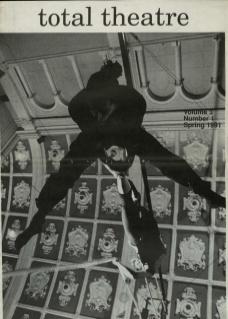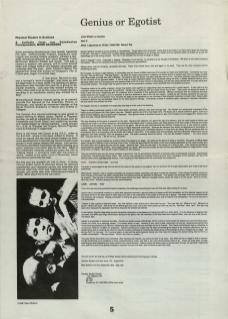Gaulier declares himself to be the antidote to Stanislavsky. ‘Forget about your character! Leave that to the writer’, or ‘Don't think about the meaning of the text. Just say it.’ All the time he plays deeply psychological games, to cut through our masks and our personal polish to enable us to edit the psychology out of the acting process. ‘For me it is so important for an actor to laugh on stage.’
‘Even in tragedy?’ I said. ‘Especially in tragedy. Otherwise it is so boring!’ He shudders at the thought of Grotowski: ‘We want to see actors enjoying themselves. We are not interested that you have just buried your grandmother.’
Always there must be humanity, complicite and play. These three words occur time and again in his work. They are the main precepts behind everything he does.
By humanity, he means a light delicacy, a vulnerability and an almost childlike openness that reveals our fears and tenderness. Constantly you hear him say: ‘You are too hard. That was fascist.’ – by which he means insensitive or unfeeling. He wants actors to respect each other on stage, to allow each other scope to reveal their soft underbelly. He wants to see the failure, the panic and fear that is in us, not some polished, assured technique. It's the old story of the tightrope walker. If you've seen an expert tightrope walker move faultlessly along the wire, it rapidly becomes boring: but a tightrope walker who isn't very good and who appears likely to fall off at any moment is fascinating, and we can easily identity with a human being with a very clear problem. The expert may be good to look at, but the grotesque is always more interesting than the beautiful and pure.
Complicite refers to the subtle unspoken contact that actors have together on stage when they are working with a good rapport. It also refers to the unspoken contact that they have with the audience. Gaulier has no patience with the notion of the ‘fourth wall’. Like Lecoq, he wants the actors to have a clear and direct relationship with the audience, and in response to the audience's feelings. Without complicite with the audience the work quickly becomes self indulgent, and the spectator is kept at a distance or cast in the role of a voyeur. Initially we can develop complicite through eye contact, but as performers become more sensitive we begin to see complicite in the minutiae of their physical responses to each other – those subtle nuances of gesture that acknowledge space for the other person's feelings. This brings us back to humanity again, because in dramatic interaction the one cannot exist without the other.
For Gaulier, the key to complicite is through play, and play is at the nub of his teaching.
There is nothing particularly original in this: Viola Spolin and Keith Johnson also work through play. But Gaulier isn't particularly interested in the highly structured games that Viola Spolin may use. Gaulier's games are of the most basic kind. He would use a simple children's game, such as a game of hand slapping, tag or grandmother's footsteps. Such games reveal a physical impulse or élan, full of pleasure and engagement, which at the same time has a clearly defined objective.
The very simplicity of the game is essential to the work. Because the objective of a game like tag is so obvious, and the rapid cycles of action and response so innate in all human behaviour, what becomes abundantly clear in seeing actors play these games is the wide range of feelings and shifts in emotion that the players generate in the course of the game. We do not see them behaving like children; instead we see a vast range of sudden, unpredictable confrontations played out by a group of highly watchable individuals. Because we perceive their action as aggressive or nonchalant or sensual – whatever they choose to play – and because they are taking such uninhibited pleasure in what they are doing, we are presented with an ambivalence that is so compelling that we simply can't take our eyes off it. If the players lose the complicite, and the interaction deteriorates into an aggressor and victim situation, then the pleasure is lost. The action suddenly becomes boring. ‘You act like Saddam Hussein ... You have fascist feet. They are not funny... We do not buy. Sit down!’
For Gaulier, play is to be teased out of every action that happens on stage. He looks for the game of being a murderer, the game of falling down dead, the game of falling in love or drinking a cup of tea. Finding the game behind the action is the most creative application of the notion of play – it is the most open sort of game we can use on stage: personal play. Here we see play in the sense of a child at play. Play becomes something pleasurable but apparently aimless like sunlight playing on a pond. With this sort of play, we can find the most effective action on stage without trying to be clever or original. Here we are invited to follow our own pleasure.
Play and complicite give us such strong impulses to work from that the conventional hierarchy of dramatic action is completely reversed. Stanislavsky emphasises characterisation before action. Not until we have defined the emotional history and the inner monologue of the character can we know how to make truthful psychophysical actions. From his point of view therefore we can summarise the process as:
TEXT – CHARACTERISATION – ACTION
The actor is encouraged to dig into the text to find clues to the person to be played; then to reinforce this through observation and recall of personal experience.
With Gaulier, however, true to Lecoq's philosophy of movement before everything, the game reveals the character. If we change the game, we give a fresh impulse to the actor, the action changes, and this influences what we perceive as character. The spoken text emerges fresh and unencumbered by analysis. ‘The text sits on the action like the sauce sits on the meat. Not as in nouvelle cuisine, where the meat is on the sauce – which is ’orrible, don't you think?’ Gaulier's process could be summarised as:
GAME – ACTION – TEXT
This is the real controversy behind Gaulier's teaching. He challenges everything we have all held dear about acting for so long.
Anyone who is completely involved in a game with someone else with a genuine feeling of pleasure will find complicite, but this delicate rapport will all too easily be lost if the actor starts to worry about his role, or the mechanics of the scene or the text he is saying. The actor must find complicite with the character he is playing. Playing a character is finding the game of playing somebody else, and for Gaulier it is unimportant. He runs no courses in characterisation
‘Theatre is like a game of hide-and-seek. You hide behind a door and let your friend look for you. You hear him cry. “Where is he? - Where's he gone? - Where are you?” And bit by bit the feeling gets too much, and if your friend gives up then you cry out, “Yoo-hoo! Here I am!” And you hug each other because the separation has felt so long and the emotion so intense.’
In the theatre, disguise (disguising yourself as another character) is the pleasure of losing yourself for a short while. It is the pleasure of playing hide-and-seek, and when you forget the emotion and joy of the game, then the character of the play becomes weighed down, true; too true to be honest – the theatre dies.
Gaulier is a specialist in theatrical mortality. He tells you what he sees unflinchingly, which is why to some people he appears so hard and destructive. Gaulier isn't hard; he is searingly honest. It is theatre which is hard. Honesty is very hard to take particularly for young, inexperienced performers much more accustomed to an informal relationship with a teacher than you are likely to find in France. The French authoritarian style is unfamiliar to us, and can easily be mistaken for arrogance. Gaulier's presence in a class has the effect of elevating the status of the simplest exercise to that of a performance, and to complete the effect he has the uncanny technique of involving the whole group in the analysis of what is happening on stage. ‘Do we buy this?’ he may say. Or if a scene begins to die and the actors become boring, you may hear him engage the person sitting next to him in a sudden conversation. ‘I like your shoes. Did you buy them in London...?’
The actor Simon Dormandy once remarked, 'After working with Gaulier, you come out with X-ray eyes. But when you're on stage in such a session it's like performing to an audience of thirty uncompromising critics, and that is the most disconcerting thing of all. There are thirty pairs of eyes watching you and subjecting your every move to the utmost scrutiny.’ Gaulier invites the whole class to see the work through his particular magnifying lens; and this is one of his greatest strengths, because his lens is so dear, and his world so painfully funny.
You can try him for size live, as Philippe Gaulier will be spending the coming year in Britain. Summer School runs from 17 June - 2 August. Main School runs from 30 September - 15 May.

